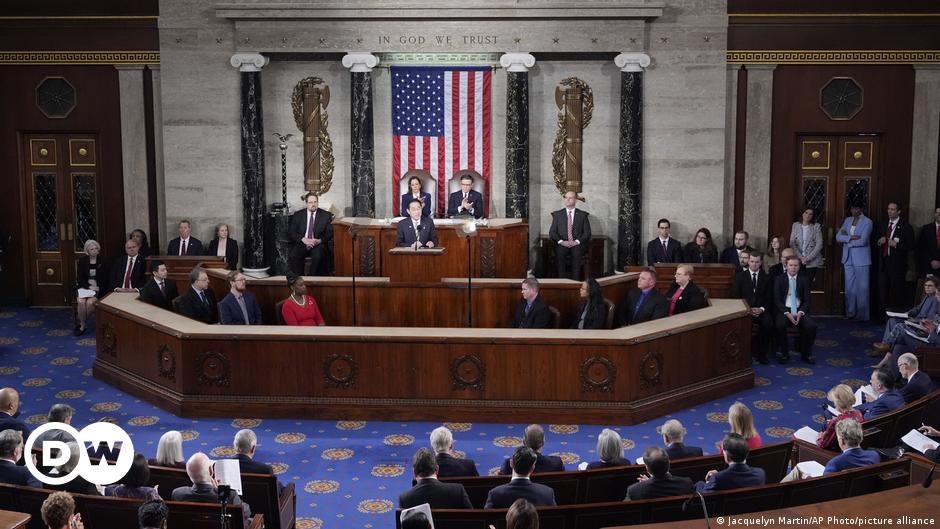
[ad_1]
US President Joe Biden, Japanese Prime Minister Fumio Kishida and Philippines President Ferdinand Marcos Jr. are meeting on Thursday in Washington for their first-ever trilateral defense summit.
The meeting comes as Chinese and Philippines coast guard vessels in the disputed South China Sea regularly become involved in skirmishes, with China increasingly asserting its territorial claims in the region.
Kishida, for his part, addressed Congress on Thursday as part of a Washington visit, becoming the second Japanese premier to do so since Shinzo Abe in 2015.
His address, which comes after a Wednesday summit with Biden, focused on the importance of a strong US-Japanese partnership amid growing skepticism in Congress, particularly on the part of Republicans, about US involvement abroad.
Kishida calls for US to overcome ‘self-doubt’
Kishida urged US lawmakers to overcome “self-doubt” over the country’s global leadership role, and said that Japan was determined to do more to share responsibility with the US.
“As we meet here today, I detect an undercurrent of self-doubt among some Americans about what your role in the world should be,” he told lawmakers.
“The international order that the US worked for generations to build is facing new challenges, challenges from those with values and principles very different from ours.”
He said that while he understood “the exhaustion of being the country that has upheld the international order almost single-handedly,” he believed that US leadership in the world was “indispensable.”
“Without US support, how long before the hopes of Ukraine would collapse under the onslaught from Moscow?” he asked.
Kishida’s address comes amid deadlock in Congress on providing Ukraine with military aid.
“Without the presence of the United States, how long before the Indo-Pacific would face even harsher realities?” he said.
Kishida said that China’s actions in the South China Sea “present an unprecedented, and the greatest, security challenge.” He said that this posed challenges “not only to the peace and security of Japan but to the peace and stability of the international community at large,”
What else is on the summit agenda?
Ahead of the meeting, Philippines President Marcos said a main focus of talks would be ways of avoiding conflict in the South China Sea.
“The main intent of this trilateral agreement is for us to be able to continue to flourish, to be able to help one another, and … to keep the peace in the South China Sea and the freedom of navigation in the South China Sea,” he told reporters before departing for Washington on Wednesday.
Kishida has said that Japan, the US and the Philippines needed to cooperate closely to ensure “a free and open order based on the rule of law and for economic prosperity in the region.”
The US ambassador to Japan, Rahm Emanuel, said on Monday that China was constantly using “coercion” and pressure on countries including Japan and the Philippines.
Among other things, the leaders are expected to announce a joint patrol in the Indo-Pacific by their coast guards in 2024.
Economic issues are also likely to be discussed, with several big US-based companies announcing investments in the Philippines.
In a sign of growing US interest in the Philippines market, Commerce Secretary Gina Raimondo visited Manila last month to announce more than $1 billion (€932 million) in new investment by American companies in the country.
Time of high tension
Tensions in the South China Sea are running high amid numerous incidents, including one in March when China used water cannon to disrupt a Philippine supply mission to soldiers stationed on a grounded warship in the disputed Second Thomas Shoal.
Japan also feels under pressure from China, with Chinese coast guard ships regularly sailing near disputed Japanese-controlled East China Sea islands close to Taiwan.
On the eve of the trilateral summit, two US senators on Wednesday introduced a bipartisan bill to provide the Philippines with $2.5 billion (€2.33 billion) to help build up its defense capacity to counter Chinese pressure.
wd,tj,sdi/wmr (AP, Reuters)
[ad_2]
Source link







